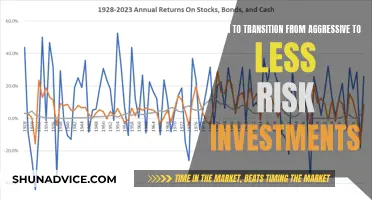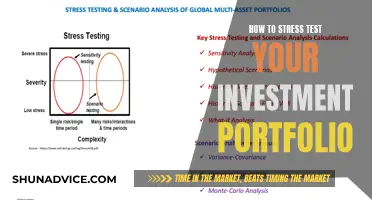
Recessions are a normal part of the economic cycle, and while they can be scary, they also present opportunities for investors. If you're thinking about what to do with your money during a recession, here are some things to consider.
First, it's important to remember that there is no such thing as a recession-proof investment. However, some investments tend to perform better than others during downturns. These include defensive sectors such as consumer staples, utilities, and healthcare, as well as dividend-paying large-cap stocks and government and top-rated corporate bonds.
If you're thinking about investing during a recession, make sure you have enough emergency savings and that you're not planning to touch your portfolio for at least five to seven years. It's also crucial to take a long-term approach and avoid obsessively checking your portfolio, as this can lead to panic selling.
Additionally, consider investing in funds rather than individual stocks to reduce risk through diversification. And remember, even during a recession, it's important to keep saving for retirement and avoid trying to time the market.
Finally, if you're feeling financially stable, a recession can be a good time to buy the dip and invest in quality companies at favourable prices.
| Characteristics | Values |
|---|---|
| Metal | Gold |
| Stock market | Continue to invest and maximise "buy low, sell high" opportunities |
| Stocks | Defensive stocks, dividend-paying large-cap stocks, large-cap stocks, stocks of larger companies |
| Bonds | Government and top-rated corporate bonds |
| Sectors | Traditional defensive sectors, consumer staples, utilities, healthcare |
| Cash | Cash and cash equivalents |
| Investments | Mutual funds, exchange-traded funds, Vanguard Dividend Appreciation ETF, Vanguard Dividend Appreciation ETF (ticker: VIG), Treasury bonds, gold ETFs, Schwab U.S. REIT ETF, money market funds, high-yield savings accounts |
What You'll Learn

Defensive stocks, such as consumer staples, utilities, and healthcare
Defensive stocks are a great option for investors looking to protect their portfolios during a recession. They provide consistent dividends and stable earnings, regardless of the state of the overall stock market. Here's why defensive stocks in consumer staples, utilities, and healthcare are a good choice during a recession:
Consumer Staples
Consumer staples are essential products that people continue to buy even during economic downturns. This includes food, beverages, tobacco, household items, and personal care products. Companies in this sector tend to have stable operations and strong cash flows, making them resilient during recessions. Examples include Costco, Walmart, Procter & Gamble, and PepsiCo.
Utilities
The utilities sector provides essential services such as electricity, water, and gas. Demand for these services remains relatively constant, making the sector less sensitive to economic cycles. Utility stocks have historically outperformed the broader market during recessions, making them an appealing choice for investors seeking safety. They also tend to offer dividends, further enhancing their attractiveness during uncertain economic times.
Healthcare
The healthcare sector, including pharmaceuticals, medical devices, and healthcare services, is generally resilient during economic downturns. Healthcare is considered a basic need, and there is consistent demand for these services regardless of economic conditions. Additionally, substantial federal funding for healthcare contributes to the sector's stability. Healthcare employment often increases during economic downturns, indicating the sector's resistance to economic downturns.
Advantages of Defensive Stocks in a Recession
Defensive stocks in consumer staples, utilities, and healthcare sectors offer stable and consistent earnings, even when the overall stock market is volatile. They are less risky than other stocks and can provide similar long-term gains. These sectors are also known for their mature and stable nature, with constant demand for their products and services, making them attractive options for investors seeking stability and safety during a recession.
What's the Difference: Investment vs Wealth Management?
You may want to see also

Large-cap stocks with strong balance sheets and steady cash flows
When looking for large-cap stocks with strong balance sheets and steady cash flows, investors should consider companies with low debt, profitability, and positive cash flow. These companies are more likely to get through a downturn and thrive afterward.
Some examples of large-cap stocks with strong balance sheets and steady cash flows include Microsoft, Cisco Systems, and Costco Wholesale. These companies have strong financials and have outperformed the broader market in recent years.
It's important to note that past performance does not guarantee future results, but investing in large-cap stocks with strong balance sheets and steady cash flows can be a good option for those looking for more defensive investments during a recession.
Understanding India's Investment-Grade Rating
You may want to see also

Government and investment-grade corporate bonds
Overview
Government bonds and investment-grade corporate bonds are often sought by investors during recessions due to their relative stability and income-generation potential. While government bonds are generally considered low-risk, corporate bonds can offer higher yields but carry more risk.
Government Bonds
Government bonds, such as US Treasury bonds, are issued by the Federal Reserve System, which includes the central bank and monetary authority of the United States. These bonds are considered safe because there is little to no risk of default, given the Federal Reserve's role in collecting taxes, determining monetary policy, and printing money if necessary. During recessions, investors tend to favour Treasury bonds, leading to increased demand.
Additionally, the yields on government bonds are linked to the short-term interest rates set by the US Federal Reserve. During economic downturns, the Federal Reserve tends to lower interest rates to stimulate economic activity, which results in falling bond yields. However, if the Federal Reserve increases rates to curb inflation or slow down the economy, bond prices fall and yields rise.
Investment-Grade Corporate Bonds
Corporate bonds are considered riskier than government bonds, but they can offer greater yields. During recessions, investors tend to seek out high-quality corporate bonds to mitigate risks. Ratings agencies like Moody's and Standard and Poor's assign ratings to corporate bonds, with higher ratings indicating a lower risk of default.
Investment-grade corporate bonds, typically those with ratings of "Aaa" or similar, usually see their yields fall during recessions as investors seek out these lower-risk options. On the other hand, low-grade corporate bonds often experience increasing yields during recessions, as investors demand higher returns to compensate for the heightened risk of investing in companies with weak balance sheets.
Benefits and Risks
One of the main benefits of investing in government and investment-grade corporate bonds during a recession is the stable and fixed income they provide. The demand for these bonds also tends to be higher than for dividend stocks, as lending money through bonds is seen as less risky than owning part of a company through the stock market.
However, there are risks to consider. Corporate bonds, especially those issued by highly indebted companies, carry a significant credit risk during recessions. Some corporations may go bankrupt, resulting in losses for bondholders. Additionally, high-yield or junk bonds, which are issued by municipalities or companies with a higher risk of defaulting, tend to see their prices fall during recessions as investors shy away from these riskier options.
Strategies for Investing in Bonds During a Recession
- Review Bond Durations: Some investors prefer short-duration bonds during recessions as they mature quicker and offer more liquidity, reducing the potential for losses on long-term bonds.
- Opt for Mutual Funds: Mitigate risks by investing in mutual funds that hold various bonds. These funds are actively managed by professionals who focus on high-rated bonds and track yield curves to make informed decisions.
- Choose Quality Over Quantity: While high-risk assets may promise higher yields, they also carry a greater risk of default. It's generally wiser to invest in fewer high-quality bonds from companies with strong financial positions.
Equity Investments Trading: Balance Sheet Impacts and Insights
You may want to see also

Gold and other tangible assets
During times of economic uncertainty, gold often acts as a refuge for investors. Its price tends to increase during recessions, making it a preferred hedge against economic downturns. This was observed during the Great Recession, when gold prices saw significant gains, rising from $803 per ounce in December 2007 to $934 per ounce by June 2009. Gold's performance during the COVID-19 pandemic further solidified its reputation as a stable asset in difficult economic times, as it surged to new record highs in the first half of 2020.
Gold's price also grows when consumer worries about the economy increase. This is because gold has historically been seen as a hedge against economic instability, inflation, or a declining currency. As Matthew Argyle, a certified financial planner, puts it, "gold is like economic disaster insurance." The demand for gold during recessions drives up its price, making it a smart investment to recession-proof your portfolio.
Gold is also a good portfolio diversifier. It tends to follow a different trajectory from other asset classes, so when you're seeing a downturn in one area—like the stock market—gold often gains ground, allowing you to offset those losses and reduce your overall risk.
There are several ways to invest in gold. Gold ETFs or mutual funds, for example, allow you to retain liquidity. Gold individual retirement accounts (IRAs) are also a good option. With these approaches, you can avoid the troubling aspects of gold ownership, such as reselling coins, high broker fees, transportation, storage, and insurance.
In addition to gold, other tangible assets that can be considered during a recession include:
- Silver: Silver is another precious metal that is often seen as a store of value and a hedge against inflation. It tends to be more volatile than gold but can offer higher potential returns.
- Real estate: While the real estate sector may face challenges during a recession, certain segments like rental properties may remain stable or even perform well as more people rent instead of buying.
- Art and collectibles: Fine art, vintage cars, rare collectibles, and other tangible assets can be alternative investments during a recession. These assets may hold their value or increase in price, especially if they are in high demand.
Understanding Your Financial Investment Portfolio Better
You may want to see also

Cash and cash equivalents
Liquidity and Peace of Mind
Having a solid cash account provides liquidity and peace of mind. In a recession, the risk of job loss or unexpected bills increases, and having easily accessible funds can help navigate these challenges. The availability of cash can give you the financial flexibility and confidence to make it through uncertain times.
Low-Risk and Stable Option
Cash-based accounts are typically low-risk and stable compared to other investments. When you deposit money in a bank, you can expect to see the same amount in your account the next day, which is not always guaranteed in the stock market. Additionally, most cash-based accounts offer insurance to protect your money, such as FDIC insurance for accounts in FDIC-insured institutions.
Take Advantage of Opportunities
Keeping cash on hand allows you to take advantage of investment opportunities that may arise during a recession. When the prices of stocks, bonds, or real estate drop, having cash gives you the liquidity to snap up these discounted investments. For example, during the housing bubble burst in the mid-2000s, investors with cash on hand were able to purchase cheap properties.
Diversification
Adding cash to your investment portfolio provides diversification, which is crucial for long-term investment success. Cash can also include other safe and liquid investments, such as money market accounts, mutual funds, certificates of deposit (CDs), and Treasury bills. These options offer both diversification and interest on your investments.
Emergency Funds
It is generally recommended to have emergency funds readily available, especially during a recession. According to the Consumer Financial Protection Bureau (CFPB), only a small percentage of households have sufficient savings to cover expenses for more than six months if they lose their main source of income. Having cash reserves can provide a financial cushion to cover unexpected expenses or job loss during an economic downturn.
While keeping cash and cash equivalents can be advantageous during a recession, it is important to consider the potential downsides, such as missing out on higher returns from other investments and the impact of inflation on your purchasing power. Finding a balance between cash holdings and other investments is essential for long-term financial growth.
Smart Strategies to Turn $200K into $1 Million
You may want to see also







